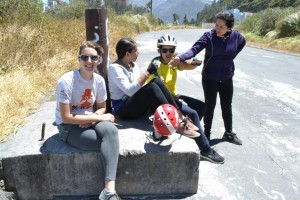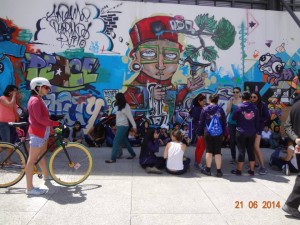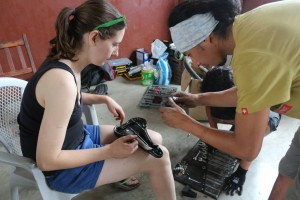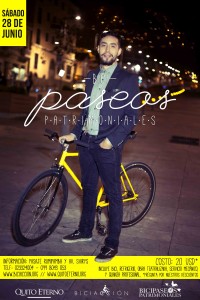While the Tour de France bicycle race is going on in Europe, many might be surprised to know that Quito, the capital of Ecuador, has a vibrant cycling community. Sally, for example, is a pro when it comes to cycling in the city, and she shared her experiences with me. She is from the US and currently works for an organisation that promotes cycling, called Biciacción.
From her experience and knowledge about cycling culture in Ecuador, it is clear that the last two years have seen the most dramatic increase in cyclists of the last decades. This is mainly due to a bike sharing programme by the municipality called BiciQ, which was launched in 2012 and is completely free of charge since the beginning of 2014. According to the BiciQ website, just under 4.000 bike shares are tracked every day. Biciacción did a bicycle count in Quito and found that two thirds of cyclists now use the bike sharing infrastructure, which constitutes a huge increase from just two years ago.
Some research suggests that the bike share does not necessarily get people out of their private cars, but it creates a free, independent and quick alternative to public transport for many. What organisations like Biciacción and others are working on is to counter some of the myths people still hold about cycling in Quito – that it is a mode of transportation reserved for super intense athletes or daring adventurers, that you need an expensive bike to fit in, or that you will not be perceived as respectable if you cycle to work. But what more and more Quiteños are realising is that cycling is actually a great mode of transportation in their city. It is much faster for the most central routes, especially during rush hour or rain, when traffic comes to a standstill. It can be safer than taxis, because of the danger of taxi based armed robberies, and gives you the kind of independence only a bicycle can. Not to mention the exercise : ) The most important reason for most new cyclists in Quito, however, might be the fact that it is completely free of charge.
Although radical change is happening in the city at the moment, many battles still need to be fought, and organisations like Biciacción are at the front line. More practical problems they are lobbying for include better thought-through bike lanes in the city, the provision of safe parking and the option of taking bicycles on public transport for longer commutes. But one of the biggest problems remaining is the car-centred attitude toward cyclists, where bicycles are simply not respected and the concept that they reduce traffic is not grasped yet. The ultimate hope is a more compassionate and considerate mind-set and that cycling will be seen as a normal and viable mode of transportation for everyone.
Even though Sally has not had any accidents in Quito on her bike, she has come close several times. As a cyclist you have to cycle defensively and sometimes train people on your rights by demanding them. But very often you have to cede your right of way, because car drivers simply aren’t aware of the traffic rules, ignore them or think they can get away with not respecting them. Even though she has many friends who have had accidents, even fatal ones, it is Sally’s firm belief that the benefits of cycling outweigh the risks.
As in many sub-cultures, the Quito cyclists are a close knit community. Interestingly, Sally explained that before the bike sharing initiative started she would recognise most regular cyclists on the street. However, the goal of cycling activism is to include more people and make cycling a mainstream activity, instead of a hip alternative for a select few. This happens through staging demonstrations, creating events, holding workshops, organising rides together and generally appropriating more spaces for cyclists in the city. The importance of connecting with fellow cyclists cannot be underestimated, as the shared body of knowledge they have about safe routes and local traffic habits can actually save lives.
An important initiative that was launched a decade ago by an organisation is the weekly Ciclo Paseo, in which some of the major traffic routes in Quito are closed off to allow only cyclists and pedestrians to circulate. This Sunday ritual has encouraged many families to take their children out for bike rides through their city safely.
An interesting group specifically called into life to promote cycling for women is called Carishina en bici, a Kichwa word which translates to ‘tomboy’ in English. A young woman from the US started the group while on her gap year in Quito. She participated in bike races and found that she was the only woman, so she wanted to encourage others by starting female only races, which then expanded into an array of events, workshops and gatherings for female cyclists. An important aspect of the group is that the more experienced cyclists teach newcomers how to cycle in the city safely.
As part of a project called ClimaCleando, six young people from Quito cycled across almost the entire country to talk to people about climate change and gather information about how it is affecting people in the different regions of the country. The promotion of cycling and recycling was also an important part of the trip. Together with the ClimaCleando crew, Sally went to give bicycle repair workshops to people in a rural area in the coastal region, and here we see her in action in Jipijapa!
If you are visiting Quito, or moving there, consider exploring the city by bicycle. There are bikes to rent at different organisations mentioned below, and by getting connected with them you can take advantage of their vast knowledge about conquering Quito by bike safely. They also organise guided tours through the historical centre during the day and at night, and many other events.
Enjoy the ride!
Chiara
Below you can find a list of NGOs promoting cycling culture in Quito through cultural events, get-togethers or demonstrations. Some of them also rent out bikes and provide guided tours for tourists and newcomers, as well as workshops about how to fix bikes and get around Quito safely on a bicycle:
http://www.biciaccion.org
http://carishinaenbici.blogspot.com/ specifically for women and girls on bikes
http://www.ciclopolis.ec/
http://andandoenbicicarajo.wordpress.com/
http://www.cicleadaselrey.com/
http://www.ciclistasurbanosuio.com/
http://enrokate.blogspot.com/
Hell bikers Quito
Embiciados del Zurich
Bici Farron
Sur en bici
Bars:
La Cleta cycle themed restaurant and bar in Quito, Lugo N24-250 y Guipuzcoa, La Floresta
Municipal bike share programme of Quito:
http://www.biciq.gob.ec/
You can find most of these organisations on facebook and twitter!










Thanks for this very interesting post Chiara, I hope you are all right.
Merci Richard : ) I am all right and hope you are as well! And I look forward to hopefully seeing you in Paris soon! Fingers crossed!!!